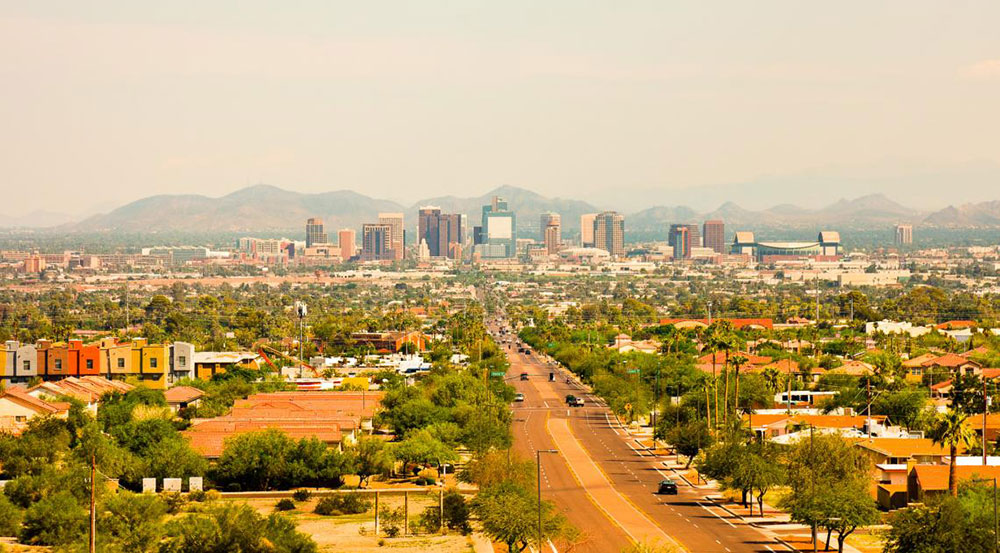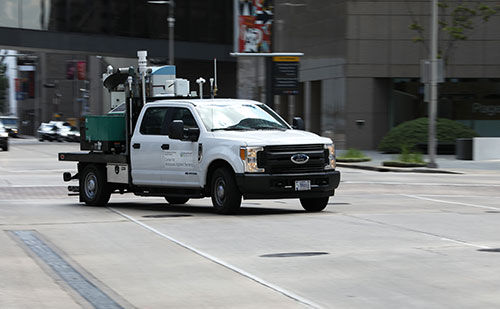ASU Leads $25M Project to Develop Southwest Urban Integrated Field Laboratory
The ASU-led industry-academic partnership involving University of Arizona, Northern Arizona University, two national laboratories, and IBM, aims to advance urban climate research and develop solutions for Arizona's most heat-vulnerable
November 9, 2022
 enlarge
enlarge
The "Southwest Urban Corridor Integrated Field Laboratory" (SW-IFL) seeks to engage Arizona communities reaching from the border with Mexico to the Navajo Nation and provide scientists and decision-makers with high-quality, relevant knowledge capable of spurring and guiding responses to extreme environmental concerns. Credit: ASU
The following news release was issued by Arizona State University (ASU). Scientists in the Environmental and Climate Sciences department of the U.S. Department of Energy’s Brookhaven National Laboratory will be important partners in the Southwest Urban Integrated Field Laboratory project. The Brookhaven team, led by Katia Lamer, will receive $4.75 Million to help characterize neighborhood- and building-scale variation in meteorological properties. The goal is to use this data to improve earth system models and promote environmental justice and equitable climate mitigation interventions. The project leverages Brookhaven Lab’s Center for Multiscale Applied Sensing (CMAS) mobile observatory, which will perform several measurement campaigns in the Arizona urban corridor over the five-year project, collecting unique observations of atmospheric and land properties. For more information about Brookhaven Lab’s role in this research, contact: Karen McNulty Walsh, kmcnulty@bnl.gov, 631-344-8350.
Across Arizona, communities are increasingly forced to deal with the consequences of extreme heat exacerbated by climate change and urban growth.
Cities in the region routinely experience more than 30 days above 110 degrees Fahrenheit each summer and growing populations continue to be strained by the complex interactions of extreme heat, atmospheric pollutants, and limited water supplies.
There are major gaps in our scientific understanding of urban environments, and additional localized data of how climate change affects diverse urban areas can help cities better address vulnerabilities against looming heat threats.
A new center based in Arizona State University’s School of Geographical Science and Urban Planning has received $25 million in funding from the U.S. Department of Energy (DOE) over five years to develop new understandings of the interacting stresses of extreme heat, atmospheric pollutants, and limited water supply on vulnerable communities across Arizona.
The center named the “Southwest Urban Corridor Integrated Field Laboratory” (SW-IFL) seeks to engage Arizona communities reaching from the border with Mexico to the Navajo Nation and provide scientists and decision-makers with high-quality, relevant knowledge capable of spurring and guiding responses to extreme environmental concerns.
 enlarge
enlarge
The Center for Multiscale Applied Sensing's mobile observatory (shown here in Houston, Texas) employs a suite of instruments to measure atmospheric conditions at fixed locations in individual neighborhoods or while moving across entire cities. Photo courtesy of the U.S. Department of Energy Atmospheric Radiation Measurement (ARM) user facility.
“We seek to understand, not only the factors that influence these complex relationships but the disproportionate impacts on vulnerable urban subpopulations,” said David Sailor, Principal Investigator on the project and Director of ASU’s School of Geographical Sciences and Urban Planning. “Our goal is to use innovations in high-resolution modeling and observations to inform the development and deployment of policies and solutions that are effective, equitable, and generalizable.”
The SW-IFL is a partnership between all three major public universities in Arizona, two national laboratories, and industry, each bringing unique skills, capabilities, and local stakeholder relationships in underserved communities to the project.
Arizona State University leads a team that includes the University of Arizona, Northern Arizona University, Oak Ridge National Laboratory, Brookhaven National Laboratory, and IBM.
The integrated field laboratory will include more than a dozen researchers across the three academic institutions and will combine high-resolution atmospheric, land surface, and infrastructure data, with advanced computer modeling, and community engagement to create new knowledge and develop regionally specific predictive tools that will be translatable to other arid regions.
Critical to the laboratory’s efforts is making sure historically underserved and disadvantaged communities that live in urban environments are represented. Field research will be conducted across the state using an array of atmospheric measurement instruments and a robust stakeholder network for the project, which already includes six city governments, multiple county-level agencies, community groups, and local nonprofits throughout the state.
“Our research team as well as the initial stakeholders that we aim to engage are exceptionally diverse in fields, areas of focus, and interests,” said Jean Andino, Deputy Director of the SW-IFL and associate professor in ASU’s School for Engineering of Matter, Transport and Energy. “This level of diversity gives a voice to individuals and organizations so that even more robust, relevant, and impactful scientific research and resilient solutions may be enabled.”
The funding for the center comes to ASU as part of the U.S. Department of Energy’s Office of Science’s Urban Integrated Field Laboratories (Urban IFL) initiative. It is focused on improving the public’s understanding of urban systems and expanding knowledge of how those systems and the climate interact with each other.
“DOE has a long history of leading in climate science and climate modeling. The Urban IFLs will contribute to ensuring that future efforts to improve our understanding of the changing global climate adequately capture the complex interdependence of natural and human system processes that influence climate dynamics,” said Asmeret Asefaw Berhe, Director of the DOE Office of Science. “In addition, the Urban IFLs are an important element of the Office of Science’s commitment to the ’Justice40 Initiative’, which prioritizes investment in diverse and minoritized communities affected by a changing climate.”
Ultimately, the new tools created by SW-IFL aim to empower the public to respond to extreme heat, while informing the development and deployment of policies and solutions that are effective, equitable, and generalizable.
“ASU has long been recognized as a global leader in urban climate science,” said Sailor, who is also the former director of ASU’s Urban Climate Research Center. “This award further cements ASU’s leadership role in the field of urban climate and positions us well for continued success as we seek to find equitable solutions to the region’s growing challenges with extreme heat.”
“We fully expect that the resilient solutions that we develop as part of the SW-IFL will be widely applicable to other urban settings across the U.S. sunbelt and indeed, to hot arid climates around the globe.”
Brookhaven National Laboratory is supported by the Office of Science of the U.S. Department of Energy. The Office of Science is the single largest supporter of basic research in the physical sciences in the United States and is working to address some of the most pressing challenges of our time. For more information, please visit science.energy.gov.
Follow @BrookhavenLab on Twitter or find us on Facebook.
2022-20933 | INT/EXT | Newsroom









